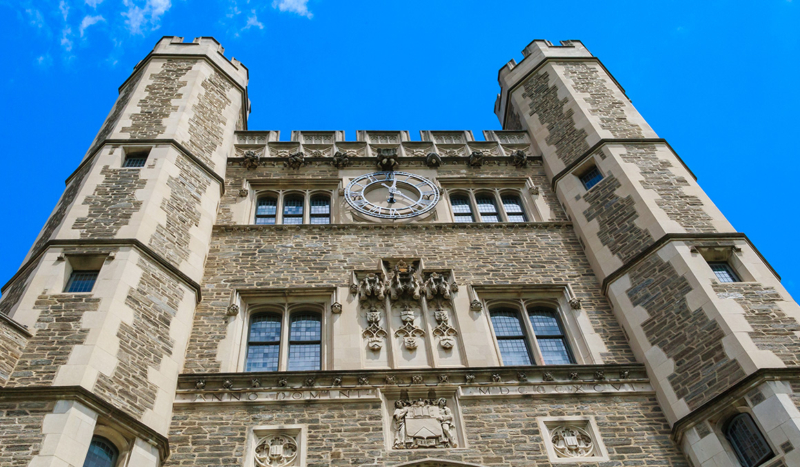
Princeton University Blair Hall by SVDPhoto / stock.adobe.com
A recent RealClearPolitics column by Princeton alumna Danielle Shapiro accuses the Ivy League institution of failing to enforce its own standards after student protesters disrupted an event featuring former Israeli Prime Minister Naftali Bennett.
During the event in McCosh Hall, protesters shouted down Bennett, pulled a fire alarm, and chanted antisemitic slurs such as “inbred swine” and “go back to Europe.” Princeton President Christopher Eisgruber apologized and promised a thorough investigation. Shapiro volunteered as a witness, meeting twice with investigators for over two hours.
She wrote that she was shocked to receive a May 19 letter signed by Vice Provost Michele Minter that said that no punishment would be pursued.
“No students would be disciplined for their premeditated disruption and blatant antisemitism,” Shapiro summarized. “As a result, seniors who participated in breaking the rules have now graduated without consequence. What’s more, no meaningful actions would be taken to preclude the same type of disruption and antisemitism from occurring in the future.”
She also criticized the process’s lack of transparency: The report was sent only to her and another complainant and made publicly available two days later – only after Shapiro said she would release it. The document was never officially posted on the university’s website or announced via press channels.
“It sure looks as though the university is trying to hide its own report,” Shapiro said.
Princeton justified its decision not to discipline masked protesters by citing its inability to identify individuals in the darkened room. However, Shapiro asserted that the university did not even consider broader security measures, such as banning masks in certain situations such as protests, a policy other institutions — including the University of California system — have already adopted.
“Princeton is sending a clear signal to those who would violate its rules and the law: Wear a mask and you can abuse Jews on campus,” she wrote. “This is absurd.”
Shapiro also pointed to the case of an outside agitator — a non-student — who disrupted the event by shouting slurs at the speaker for several minutes. According to Shapiro, the individual should never have been admitted because the event was limited to students, and his behavior violated both Princeton rules and New Jersey’s “defiant trespasser” statute.
Yet the university opted merely to ban him from campus for a year, labeling him “persona non grata.” Shapiro calls it a “penalty without meaning” for someone unaffiliated with Princeton.
According to Shapiro, Eisgruber’s pledge to “pursue disciplinary measures, as appropriate” left enough ambiguity to ultimately avoid imposing any real consequences.
“I suppose that ‘as appropriate’ is meaningful only insofar as the university can maintain plausible deniability,” she wrote.
Shapiro also warned that Princeton’s inaction may have broader implications. Federally funded universities must comply with Title VI of the Civil Rights Act, which requires protection from racial and ethnic harassment.
“If Princeton won’t take basic steps to protect its students and enforce its rules,” she asserted, “the Department of Education must.”
>> Columbia lays off 180 after Trump admin pulls $400M over antisemitism failures <<

